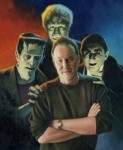Stephen Jones = sine qua non for a successful horror anthology. A Book of Horrors collects original horror stories and is brought out under the aegis of the new imprint from Quercus, Jo Fletcher Books. The book is being lauched this weekend at FantasyCon in Brighton and next week, I’ll run a competition here to decide the winner of a copy of the book, so stay tuned.
Here, Mr Jones waxes lyrical about the downfall of horror and why it needs a good shaking. Read carefully, there will be questions later.
1. The Intro to A Book of Horrors reads like a call to arms. So, what the hell did happen to horror?
Who the hell knows? Somehow, over the past six or seven years, it’s been taken over by a bunch of people who don’t want to be scared . . . who don’t like to be disturbed by horror fiction. They prefer their vampires to make love instead of sucking blood. They’d rather werewolves were leading secret military operations rather tearing people apart with tooth and fang. They want their zombies hanging out with a multitude of real and fictitious celebrities rather than eating brains. Basically, because of the people who read, write and publish this drivel, the horror genre has been creatively emasculated.
Well I, for one, have had enough. It’s about time we reclaimed the genre for our own. I start talking about this in my editorial bit (rant) in this year’s THE MAMMOTH BOOK OF BEST NEW HORROR #22, and I guess my Introduction to A BOOK OF HORRORS takes up the subject and – hopefully – provides an answer.
2. The styles of writing and range of authors in this book as very diverse – how did you select just the right mix of stories?
That was the whole point of the book – the present as wide a spectrum of stories as possible under the “horror” banner. And I think we’ve pretty much succeeded. I’m sure not everyone is going to like all the stories in the book, but that is because the range of styles and breadth of ideas is so broad. That’s what I’ve always loved about the horror genre – you can do so much while working within it!
To be honest, I was disappointed by some of the tales I received – it was like some of the authors I approached had forgotten how to write a legitimate horror story. However, as the submissions kept coming in, I realised that I was getting a lot of novellas and so, in the end, that’s how I structured the book – with alternating short stories and novellas, which I think works really well and keeps the reader interested.
As to how I selected the mix – well, that’s just editorial intuition. As it’s my name on the book as editor, the contents will always reflect my own tastes and concerns. Out of all the material I received, these were the stories that I decided worked best. Every book I edit has a different “feel”. . . a different “flow”. It’s like putting a movie or TV show together (which is what I used to do) – you instinctively know when the book is “finished”. Editing books and editing movies is a similar skill. Once I was happy with the order – once I felt that the book “flowed” properly – then it was done. A different editor may have chosen other stories and put it together differently.
3. This was an invitation-only affair (lots of velvet ropes for folk to stand behind) – was it a risk going with a book like this is today’s market?
Well, doing a high-concept original horror anthology in today’s market was always going to be a risk, and I credit Jo Fletcher for not only having belief in the project, but for also making it one of the launch titles for her eponymous new imprint from Quercus.
When we first discussed it, we agreed we wanted a book that showcased original fiction by some of the best horror writers of today – hence the invite-only stipulation. But I also had a ridiculously short amount of time to put the book together for publication in September, so I had to also somehow limit the number of submissions I had to read.
As I said, I had to reject a number of submissions – often by people who I expected better from – but that’s always part of the editing process, and I think that the final book is stronger for it. Also, a number of other writers I approached did not have the time to write something new. So, although this is not intended to be a series, we may do other volumes in the future and I will probably be looking at a different mix of contributors for those books.
4. The future of horror is …
Well, if this was still the 1980s, it would be Clive Barker! Nowadays, who knows? I’m not entirely convinced that horror – or literature for that matter – actually has a future. We live in interesting times. The whole publishing industry is changing, and horror – like all the genres – will be dragged along with it. There are still plenty of people out there who want to read horror fiction, so I am hopeful that it will survive in one form or another, but I have no idea what the future will bring . . .
5. Subtle horror or a slash fest? No, really, donuts or danishes?
Still donuts (I’m not a big fan of sticky buns), and still subtle horror (I’m not a big fan of sticky horror either . . .).
Mr Jones lives here.
http://www.stephenjoneseditor.com/index.html


